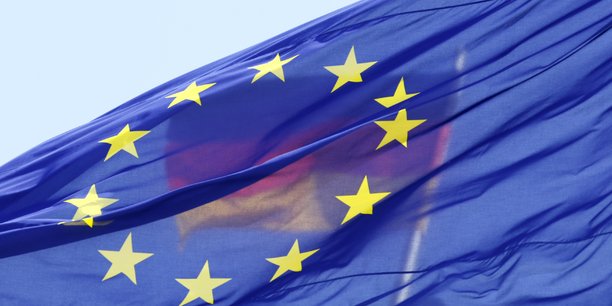
Gloomy prospects for Germany caught in the inextricable trap of its reliance on Russian fossil fuels: If the country cuts its energy supply from Russia, especially gas, today, it will plunge into recession from next year, no less than say this Wednesday in unison. five German Institutes for Economic Forecasting (DIW, IFO, IfW, IWH and RWI).
This warning could give grist to the mill of those putting the brakes on the four irons, such as Chancellor Olaf Scholz, against the adoption of “strong sanctions”, including the cessation of oil and gas purchases, at the request of Ukrainian President Volodymyr Zelensky and while the European Commission prepares a 6th wave of sanctions to break Vladimir Putin’s war machine.
†We have just imposed heavy sanctions on Russia and we are preparing for a sixth waveEuropean Commission President Ursula von der Leyen stated during her visit to Kiev on Friday, April 8 with the head of diplomacy Josep Borrell.
But this should not make us forget that the risk of a recession for Germany was already very present even before Russia started the war against Ukraine, and this, due to multiple difficulties in restarting the productive tool that was undermined by the impact of the pandemic with the disorganization of global supply chains. The institutes generally note that the German economy is “crossing difficult waters” at a time when lifting restrictions related to the pandemic could boost activity.
† Read: Germany, the weakest link in Europe
For the record, three days before Russia took action against its Ukrainian neighbor, the economic situation was already so worrying that the Bundesbank issued this warning: after a 0.7% decline in the fourth quarter of 2021, Germany “may fall sharply again due to pandemic” from January to March 2022, she wrote in her monthly bulletin that appeared on Monday 21 February.
GDP forecast lowered to 2.7% in 2022 (from 4.8% earlier)
As a reminder, technically a recession is defined by a decline in GDP for two consecutive quarters. And sure, if the “Buba” had left a little glimmer of hope then – in the conditional – that growth “accelerate again in the spring”, this evaporated with the invasion of Ukraine.
This Wednesday, in a first “central” scenario, which takes into account the consequences of the war in Ukraine with an ongoing conflict and sanctions but without taking into account a cessation of gas supplies, the five forecasting institutes have significantly lowered their growth forecasts for 2022 , now expected at 2.7%, up from an estimate of 4.8% in October. This also translates into an expected inflation rate of 6.1% this year. And by 2023, they expect GDP to rise to 3.1%.
Stopping Russian gas imports, a grim scenario
In an “alternative scenario”, the five forecasting organizations calculated what the economic development would be if the Russian supply of natural gas and oil were to stop – ie immediately – from mid-April.
In this case, it is a “brutal recession” in 2023 that would hit Germany: the German economy could contract by 2.2% and inflation could rise to 7.3%, i.e. “the highest value since the founding of the Federal Republic”†
The GDP decline is expected to be 5% in the second quarter of 2023, before the economy recovers at the end of the year. This GDP loss would amount to 220 billion euros for 2022 and 2023, the equivalent of 6.5% of annual assets, specify .
A Gordian knot
Berlin, which supplied more than 55% from Russia before the war, has already reduced this share to 40%, but despite several steps it remains hypothetical to find other suppliers that will make it possible to make up for the missing quantities and within satisfactory deadlines.
† Read: Gas: exporting countries must limit their aid to Europe
At the political level, the possible embargo on Russian gas has been the subject of fierce discussions among EU Member States for several weeks, with Berlin being one of the main opponents of an immediate cessation of imports, believing that economic and social peace in Germany at stake.
For the time being, Germany does not think it will be able to do without Russian gas before mid-2024 and has activated the first level of its emergency plan at the end of March to guarantee natural gas supplies in the face of the threat of a halt to Russian supplies.
† Read: Refusal to pay in rubles threatens Russian gas supply, Germany initiates emergency plan
Difficult awakening for Germany, which measures the vulnerability of its economy
Overall, the Russian war in Ukraine has really exposed the fragility of the German economy.
Because in addition to the dependence on Russian coal, oil and gas, which was repeatedly mentioned by Berlin for opposing a ban on the import of gas from Russia into the EU, this war has revealed another dependency, also linked to the export-based model: the one with regard to China.
As an exporting country, Germany is indeed China’s most important economic partner. In 2021, more than 245 billion euros was exchanged between the two countries, an increase of 15.1% compared to the previous year, which was marked by Covid-19.
However, an awareness is beginning to form among German industrialists, half of whom, according to a study published in March, would be willing to reduce their imports of products from China for ethical reasons. The war in Ukraine has raised questions about Berlin’s commercial ties with other countries accused of human rights violations, such as China.
On April 6, in an interview with the newspaper Die ZeitGerman Finance Minister Christian Lindner (also leader of the liberal FDP party), who was concerned about Germany’s “strong economic dependence” on China, called on German industrialists to “diversify” the country’s trading partners in a context of international tensions exacerbated by the war in Ukraine.
“Perhaps now is the time to prefer to do business with people who are not only business partners, but also want to be partners from a values perspective,” said Christian Lindner.
(with AFP and Reuters)



